If you’re active on social media, you’ve probably been tagged in a comment or two by a friend entering a giveaway. You know the drill — a flashy post, an attractive prize, and that familiar call-to-action of “like, follow, and tag a friend.” But here’s a question: Are these contests still as effective as they used to be?
Social media is bigger than ever, with over 5.24 billion users worldwide and the average person spending about 2 hours and 21 minutes scrolling each day. Yet engagement rates are slipping across platforms, which means brands need to be smarter about how they capture attention.
In this post, we’ll take a close look at social media contests in 2025. What are they, and how do you measure their success? We’ll even spotlight a few top brands to see their take on the tactic. Let’s dive in.
What Is a Social Media Contest?
At its core, a social media contest is simply a way to get people interacting with your brand online. You ask followers to do something — like, comment, follow, share — for a chance to win a prize.
So why do brands run them? A well-designed contest can grow your followers, spark conversation, and drive conversions. You can also use contests to collect user-generated content (UGC) that you can repurpose later. It’s a win-win: Your audience gets a reward, and your brand gets attention and content.
There are a few popular types of contests you’ll see online:
- Like, comment, and follow to win. This classic approach is quick to enter and easy to promote.
- Tag-a-friend giveaways. Followers tag friends to enter, helping your contest reach more people.
- Photo or video submissions. Fans create content for a chance to win the prize. Submissions can be shared by using a branded hashtag, tagging your account, or uploading through your website.
- Polls or quizzes. People vote or answer questions for a chance to win, boosting interaction while helping you learn more about your audience.
You can also lean on tools that help implement the contest. Platforms like Comment Picker, SweepWidget, and RafflePress, for instance, handle entries, random draws, integrations, and basic tracking. This helps cut down manual work and keeps things fair.
That said, a contest isn’t always a guaranteed win for your brand. Next up, let’s look at whether contests still work and how to measure that.
Are Social Media Giveaways Effective?
The short answer? Contests can be effective — but there are a few things to keep in mind.
What Makes a Giveaway Successful vs. Not?
The difference often comes down to alignment with business objectives:
- Successful giveaways have a purpose. They’re built around a clear goal, whether that’s building awareness, driving engagement, or growing an audience. The prize, entry method, and follow-up plan all work together to support that goal.
- Unsuccessful giveaways tend to focus on vanity metrics alone. They chase likes and followers with no plan to keep those new people engaged. They attract “freebie seekers” who disappear the second the prize is gone.
There are also legal requirements to consider. Every platform has its own promotion guidelines, and ignoring them can get your campaign shut down. The FTC also expects transparency. That means clear rules and proper disclosures. Data privacy should also be handled with care to maintain audience trust.
The good news? When your contest is tied to measurable goals and backed by strategy, it can deliver real results. The key is tracking the right metrics — which we’ll dive into next.
Measuring Contest Success
Running a contest is one thing, but knowing whether it actually worked is another. The key is tracking metrics that tie directly to your goals. Different contests have different objectives, so the “right” metrics depend on what you’re trying to achieve.
Awareness: Reach, Impressions, Views
If your goal is to get your brand in front of more people, you’ll want to track reach and impressions. Reach tells you how many unique users saw your contest, while impressions show the total number of times it appeared in feeds. For video content, you may also want to look at views to understand how many people actually watched your content.
Some brands, like Owala, use giveaways strategically to bring attention to new products. Ahead of a launch, they’ll host a giveaway featuring the latest item, generating excitement and visibility before the product even hits shelves. In fact, 13 of Owala’s top-performing Instagram posts by impressions were giveaways, showing how effective contests can be for awareness.
Take Owala’s Lilo & Stitch themed giveaway shown below, which received an estimated 4.26M impressions. It also earned a 17.3% engagement rate by follower, making it the brand’s most engaging Instagram post so far this year.
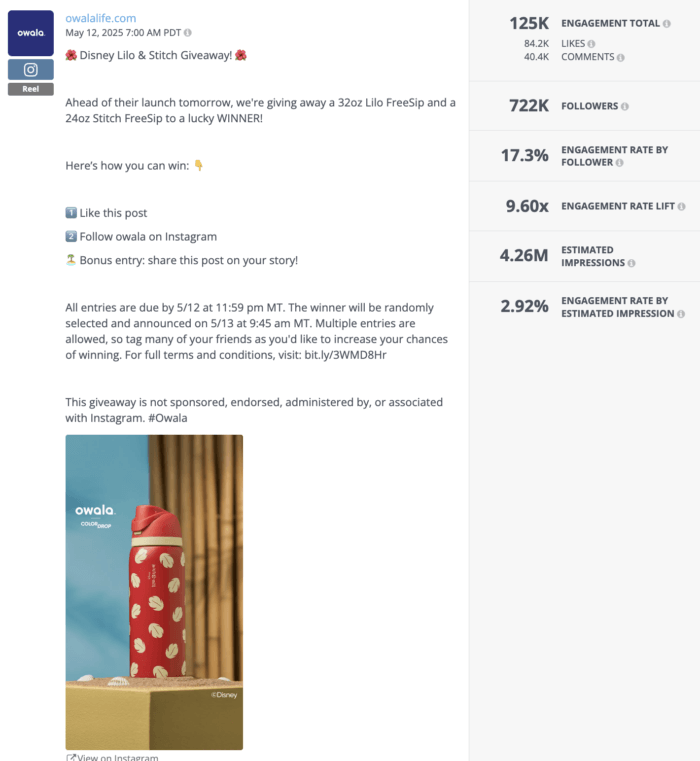
Engagement: Likes, Comments, Shares
Engagement measures how people interact with your contest. This includes likes, comments, shares, and saves — anything that shows your audience is actively participating rather than just scrolling past.
Many contests specifically request engagement as a requirement, asking users to like the post or comment to enter. And there’s a good reason for this: Social media algorithms reward engagement.
The more interactions a post receives, the more likely it is to be shown to other users. In other words, each like, comment, or share not only counts as participation but also amplifies the contest organically.
Most importantly, engagement metrics show how well your content resonates. A contest post that performs above your usual engagement rate is a good sign that the prize, messaging, or format hit the mark. You can also benchmark against the industry average to see how your campaign compares to your peers.
Pro tip: With Rival IQ, you can track both your own performance and see how you stack up against the competition in one intuitive dashboard.
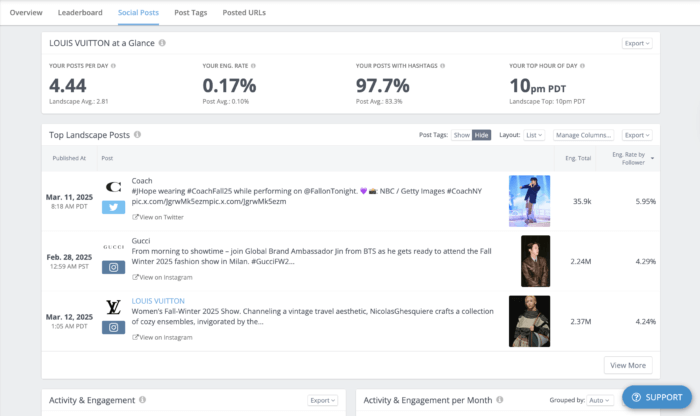
Plus, with the Post Tags feature, our platform automatically tags contests, making it easy for you to find similar campaigns in your competitive landscape, get inspiration, and compare your contests’ performance to your industry peers’.
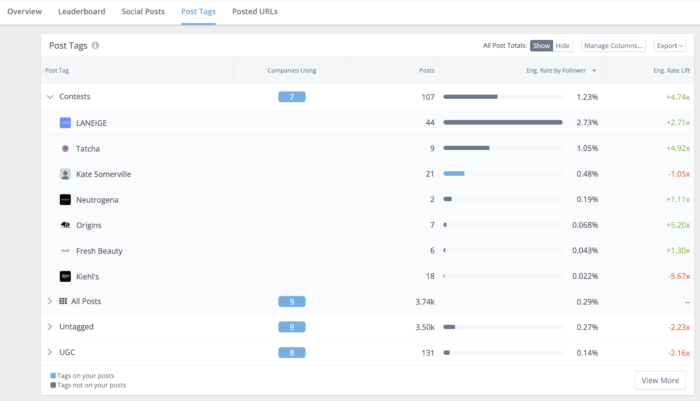
Audience Growth: Followers and Subscribers
If one of your goals is growing your social audience, track follower or subscriber growth during and after the contest.
Having participants follow the brand account is a popular contest requirement for a reason. It’s not about inflating numbers — it’s a way to connect with participants after the contest ends, giving you the opportunity to engage them with future campaigns, promotions, or content.
If you want to boost growth even more, consider collaborating with another brand. When two brands co-host a giveaway, they both get exposure to each other’s audiences — and that means more potential followers all around.
Take Kitsch and Goli Nutrition, for example. They recently partnered on an Instagram giveaway and, by cross-promoting, are reaching people who might never have come across their brand otherwise.
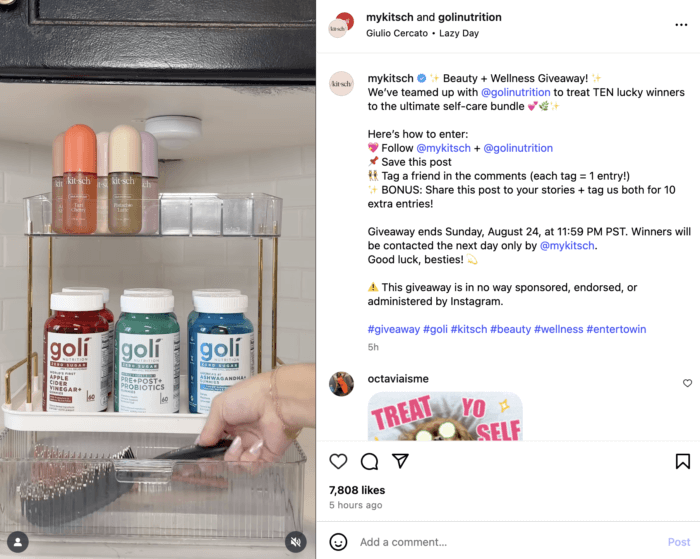
User-Generated Content: Hashtags, Tagged Posts, Online Submission
Another valuable goal for social media contests is encouraging user-generated content. UGC introduces your brand to new audiences in a way that feels more genuine than a paid ad. Plus, it gives you authentic social media content to fold into your own strategy.
The simplest way to track UGC is by asking users to use a unique hashtag or tag you in the post. Tracking hashtag usage or tagged posts will tell you how many people are sharing your brand and how far your contest is traveling beyond your existing followers.
Pro tip: You can create rules to tag and track certain kinds of posts in one centralized and customizable dashboard in Rival IQ, making it easy to keep up with campaigns.
You don’t have to limit submissions to social platforms either. Some brands collect UGC directly through their websites. A great example is GoPro. Their entire social strategy thrives on customer-submitted content. After all, it makes more sense for users to capture epic footage out in the world than for GoPro to try to create it all themselves.
Through their GoPro Awards, the company runs themed challenges where users submit clips for a chance to win gear, cash prizes, and social features. It’s an effective strategy. This year, GoPro’s most engaging posts on both Facebook and Instagram — measured by engagement rate by follower — came from contest winners, each earning a $500 prize.
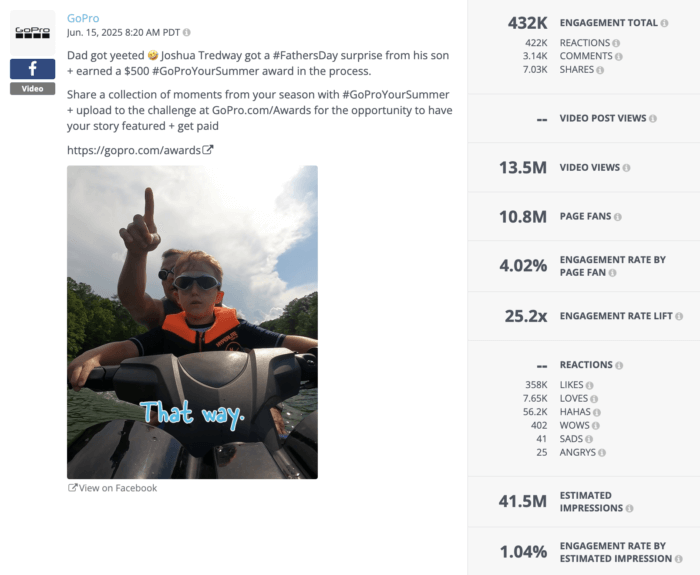
Conversions
Giveaways are great for boosting exposure and brand awareness, which may lead to sales down the line — but unlike reach or engagement, it’s harder to draw a direct line between a contest and a purchase.
That said, you can still use contests to encourage conversions that matter for your business. For example, you might make downloading your app or sharing an email address a requirement to enter. These tactics are less common since they take users off the social platform, but they’re perfectly valid options.
Whether it’s collecting leads, driving app installs, or growing your newsletter, the key is choosing a conversion that fits your business model. Think about what action will bring the most value long-term and design your contest to encourage it.
ROI: Cost vs. Benefit
Finally, evaluate the return on investment. Think about everything you invested — prizes, advertising, other fees — and weigh that against the results. Did the contest bring enough awareness, engagement, or leads to justify the spend?
Ultimately, metrics only matter if they connect to your goals. A contest that drove tons of likes but no new subscribers may not be a win if audience growth was your priority. By tracking the right numbers and comparing them against what you set out to achieve, you’ll get a clear picture of whether the contest was worth it and what to tweak next time for even better results.
Wrapping It Up
Social media contests can still deliver big in 2025. The key? Know what you want out of a contest, track the right metrics, and learn from each run. Done well, contests aren’t just about handing out prizes — they become opportunities to connect, engage, and create momentum for your brand.
